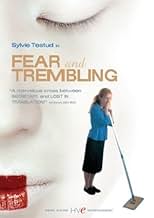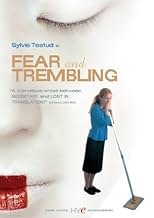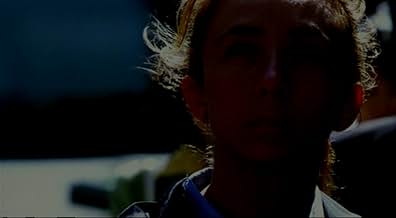Füge eine Handlung in deiner Sprache hinzuA Belgian woman looks back on her year at a Japanese corporation in Tokyo in 1990. She is Amélie, born in Japan, living there until age 5. After college graduation, she returns with a one-ye... Alles lesenA Belgian woman looks back on her year at a Japanese corporation in Tokyo in 1990. She is Amélie, born in Japan, living there until age 5. After college graduation, she returns with a one-year contract as an interpreter. The vice president and section leader, both men, are boors,... Alles lesenA Belgian woman looks back on her year at a Japanese corporation in Tokyo in 1990. She is Amélie, born in Japan, living there until age 5. After college graduation, she returns with a one-year contract as an interpreter. The vice president and section leader, both men, are boors, but her immediate supervisor, Ms. Mori, is beautiful and trustworthy. Amélie's downfall b... Alles lesen
- Regie
- Drehbuch
- Hauptbesetzung
- Auszeichnungen
- 5 Gewinne & 2 Nominierungen insgesamt
Empfohlene Bewertungen
All the Japanese characters were speaking to me in a moving way, for they were crafted according to real, human beings from everyday life. The casting was excellent and listening to the musicality of a once learned with enthusiasm and now forgotten foreign language was a treat. Casting was excellent and the Japanese actors all embodied perfectly their characters.
I missed seeing more Japanese female characters, especially those "office ladies" that would contrast with the leading Japanese lady (Fubuki-san) though, and help understand where she came from. I also missed seeing the French leading lady (Amelie-san) immersed in the Japanese very codified everyday life out of work : the kind of place where she lived, the kind of food she ate, the kind of places where she used to hang around when not spending her nights at the office, how she related with her co-workers, neighbors, friends during her spare time...
Have a wonderful time!
The plot involves a Belgian woman (Amelie) who loves Japan (having spent her early childhood there) and who obtains employment at a huge corporation in Tokyo. Through various cultural misunderstandings, she continually gets demoted until her job mainly involves cleaning toilets.
The film depicts late 80's / early 90's Japanese corporate culture as unbelievably hierarchical, brutal, inefficient and de-humanizing. I suspect this was exaggerated, for comic and dramatic effect. And, for the sake of the Japanese people, I hope so.
My only two complaints about Fear and Trembling are (i) the over-use of the voice-over narration to tell the story, and (ii) the fact that we do not get any hint of Amalie's life (or anyone else's life) outside the office.
With respect to the latter point, another commenter noted "In the novel Amelie Nothomb writes : this could be leading to think I had no life outside the office, which is wrong. but for a schizophrenic reason, when I was at job in the 44th floor toilets of the yumimoto company I couldn't think of myself as the same person respected and loved by friends outside."
Overall, it was entertaining, thought-provoking, and by the end, strangely moving. Both my wife and I got a bit misty-eyed at the end - I was a bit surprised that the movie drew such sudden emotion out of me. Definitely worth seeing.
A mind-boggling view into the heart of Japan, "Fear and Trembling" includes some of the incongruous hilarity of Sofia Coppola's "Lost in Translation" and the monstrous (if ceremonially correct) barbarity of Nagisa Oshima's "Merry Christmas, Mr Lawrence," but it's also tremendously new and different. It will make you laugh, cringe, learn, and refuse to accept what appears obvious to those on the screen.
As those two other Western perspectives on Japan, Alain Corneau's story is about the comedy and trauma of East-West relations, in this case through the epic (and yet deeply personal) struggle of a young Belgian woman "to fit in" with a Tokyo corporation.
Amélie Northomb is the author of the autobiographical novel on which the film is based, Sylvie Testud is the brilliant actress who plays the role. Amélie was born in Tokyo, daughter of Brussels' ambassador to Japan (although the film doesn't say this), lived there until age 5 when her family returned to Belgium. She considered Japan her real home, maintaining a deeply-felt, romantic attachment to the language and culture of the country.
In her mid-20s, Amélie gets a job as a translator with a giant corporation in Tokyo, and the film tells the story of her often incredible life of abuse, humiliation, and (to an outsider) near-insane routines that's the lot of Japan's salarymen... especially those who are women. Amélie goes from doing brilliant multilingual research - in violation, as it turns out, of company procedures, defying a supervisor's hatred of "odious Western pragmatism" - to resetting calendars... to serving coffee... to being made to copy the same document over and over again... to months of cleaning restrooms.
Impossible? Well, yes, but it is both "a true story" in fact, and Corneau - the great director of "Tous les matins du monde" and "Nocturne indien" - somehow gets the audience a few tentative steps closer to the "Japanese mind." It is, of course, only a partial success, but in the end, there is a fragile, right-brain appreciation of what is "most Japanese" in the film: Amélie's persistence through it all, "to save face."
At the same time, much of the conflict remains incomprehensible to an outsider, such as a supervisor's order to Amélie (hired because of language ability) "to forget Japanese" when there are visitors to the office. His explanation: "How could our business partners have any feeling of trust in the presence of white girl who understood their language? From now on you will no longer speak Japanese."
In the large, uniformly excellent Japanese cast, the name to learn is that of Kaori Tsuji, an amazing physical presence: a 6-foot-tall Japanese woman with a face that's both icily "perfect" and achingly vulnerable. In her film debut, Tsuji successfully copes with a major role that requires projecting many deep, often conflicting emotions - without changing her uniform, constant "correct expression."
Personally, "Fear and Trembling" came as a surprise, almost a shock. I thought, mistakenly, that after living in Hawaii for a decade, and having besides innumerable points of contact with Japanese culture and people, I wouldn't feel about an apparently truthful picture of the country as if I observed some bizarre and incomprehensible aliens... but I did.
Then, when the boss came 'round to ask which Saturdays I would like to come in and work, I asked "Do all full-time employees have to come in on some Saturdays?"
"Oh yes, we do."
"Well then, since I am only 'part-time', I will not be able to come to work any Saturdays. Sorry...."
This was a rare moment of zen revenge, which is what you will hope for when Amelie is subjected to life in HER Tokyo office. No, this is not Lost In Translation, which apparently did not enthrall the foreigners who were living in Tokyo, by the way. More like L.I.T. on steroids.
This is a fable, based on reality. Tokyo can be intense. I never flew above the city, but I got twisted enough to wish it.
By the way, the director told our audience that most of the film was done in an office in Paris, and that the lead actress did not know a word of Japanese before the film. This shocked me, as I was quite impressed with her pronunciation and speed. I thought she spoke Japanese, and felt humbled by her skill...
To all the GAIJIN out there - see this film! For others, I would suggest Japanophiles and quirky movie lovers should go, and the Hollywood action types should pass.
Belgian Amelie seems to know Japan and it's culture, but can't help get into trouble by acting "Western" while working in a Japanese office. As the film goes on you see Amelie make mistakes and you get the urge to warn her not to get into trouble. Her sense of absurdity and courageous submittance make her a likable character. The constricted setting in which people don't express their feelings make the internal monologues and narration very functional.
The story is strong, the filming sober and functional, the cast well-picked. A nice experience for anyone who wants to watch a production from outside LA.
Wusstest du schon
- WissenswertesBased on Amélie Nothomb's real-life experience when she was living Japan in her early twenties in the early 1990s . The real-life events narrated in the film took place at the same time than those narrated in Tokyo Fiancée (2014) which depicts Amélie Nothomb's romance with her then-fiancé Rinri. However, Tokyo Fiancée's director Stefan Liberski set his film in the early 2010s.
- PatzerWhen Amélie sorts all GmbH clients in the same folder, her superior explains her that "GmbH is like Ltd in English or SA in French". GmbH is not SA in French, but SARL (Société anonyme à responsabilité limitée).
- VerbindungenFeatures Furyo - Merry Christmas, Mr. Lawrence (1983)
- SoundtracksGoldberg Variations
(selections)
Written by Johann Sebastian Bach
Performed by Pierre Hantaï, harpsichord
Top-Auswahl
- How long is Fear and Trembling?Powered by Alexa
Details
- Erscheinungsdatum
- Herkunftsländer
- Offizielle Standorte
- Sprachen
- Auch bekannt als
- Fear and Trembling
- Drehorte
- Produktionsfirmen
- Weitere beteiligte Unternehmen bei IMDbPro anzeigen
Box Office
- Bruttoertrag in den USA und Kanada
- 126.684 $
- Eröffnungswochenende in den USA und in Kanada
- 6.007 $
- 21. Nov. 2004
- Weltweiter Bruttoertrag
- 2.305.213 $
Zu dieser Seite beitragen





















